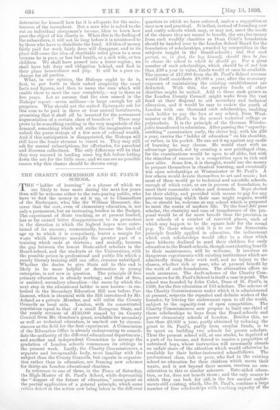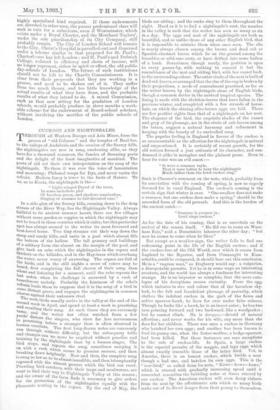THE CHARITY COMMISSION AND ST. PAUL'S SCHOOL. T HE " ladder
of learning" is a phrase of which we are likely to hear more during the next few years than will be welcome either to the rate-paying public, who have to find the money to set it up, or to Chancellors of the Exchequer, who, like Sir William Harcourt, dis- cover that the cost, even of elementary education, is not only a permanent, but an increasing, burden in the Budget. The experiment of State teaching, as at present limited, has so far caused bitter disappointment to its promoters in the direction in which the highest hopes wore enter- tained of its success ; economically, because the limit of age up to which it is compulsory, leaves a margin for waste which destroys annually the greater part of a training which ends at thirteen ; and socially, because the gap between the lowest State-aided scholars in the Board-school, and the students at the Universities, with the possible prizes in professional and public life which a purely literary training still can offer, remains unbridged. Whether the desire to give State aid to this end is likely to be more helpful or destructive to young enterprise, is not now in question. The principle of free primary education is already working ; and that of free, or assisted, secondary education—the name by which the next step in the educational ladder is now known—is em- bodied in the Secondary Education Bill now before Par- liament, which is identical with the Bill introduced by Mr. Adana as a private Member, and will enlist the County Councils as local aids. London, with its concentrated population equal to that of a small European State, and the yearly revenue of £130,000 reaped by its County Council from Mr. Goschen's grant, available for secondary as well as technical education, is marked out by circum- stances as the field for the first experiment. A Commission of the Education Office is already endeavouring to consoli- date the authority of the different educational departments ; and another and independent Committee to arrange the gradation of London schools commences its sittings in the present week. Lastly, the Charity Commissioners, a separate and irresponsible body, more familiar with the subject than the County Councils, but experts in organisa- tion rather than in education, are framing new schemes for thirty-six London educational charities.
In reference to one of these, in the Times of Saturday, the High-Master of St. Paul's School, while deprecating the " despair of the future of education," consequent on the partial application of a general principle, which some critics detect in the action now being taken in the different quarters to which we have referred, makes a suggestion at once new and practical. It is that, instead of founding new and costly schools which may, or may not, meet the needs of the classes they are meant to benefit, the surplus money from such wealthy charities as Dean Colet's foundation should be handed over to the London School Board for the foundation of scholarships, awarded by competition in the subjects taught in the Board-schools ; and that each parent, or, in fact, the boy himself, should then be free to choose the school to which he should go. For a great number of such scholarships, which should be of not less than £30 a year in value, funds would at once be available. The income of £17,000 from the St. Paul's School revenue would itself contribute £8,000 a year, after the necessary expenses of maintaining the existing establishment are deducted. With this, the surplus funds of other charities might be united. Add to these such grants as the London County Council might make from the vast fund at their disposal to aid secondary and technical education, and it would be easy to endow the youth of London with one thousand such scholarships, enabling each holder to pay the fees at any school, from West- minster or St. Paul's, to the newest technical college or polytechnic. It is the principle of the German Wander- jahre transferred to education. After passing the " capacity- catching " examination early, the clever boy, with his £30 a year, carries the " ladder of education" on his shoulder, or rather, in his pocket. He can set it up against any castle of learning he may choose. He would start with an advantage gained, not by creating a new privileged class, for the examinations would be open to all alike, but with the stimulus of success in a competition open to rich and poor alike. Some few, it is thought, would use the money to prepare themselves in classical learning, and eventually win open scholarships at Westminster or St. Paul's. A few others would devote themselves to art and music ; but most of them would go to technical and scientific schools, enough of which exist, or are in process of foundation, to meet their reasonable wishes and demands. Boys elected for their ability, and provided with means to pay for any previous training which their case might require, would be, or should be, welcome at any school which is prepared to meet the wants of modern life. To the bond-fide poor scholar, the elasticity and ease of transference of the pro- posal would be of far more benefit than the provision in new schools of a number of reserved places, each of which may happen to be the square hole for the round peg. To those whose wish it is to see the democratic principle frankly applied in education, the inducement which such scholarships would offer to a class which have hitherto declined to send their children for early education to the Board-schools, though contributing heavily to their maintenance, will be welcome. It involves no dangerous experiments with existing institutions which are admittedly doing their work well, and no injury to the classes, whether rich or poor, who at present benefit by the work of such foundations. The alternative offers no such assurance. The draft-scheme of the Charity Com- missioners for St. Paul's School is itself a case in point. The school was founded by John Colet, Dean of St. Paul's, in 1509, for the free education of 163 scholars. The scheme of the Charity Commissioners under which it is administered at present, respects the repeated and definite wishes of the founder, by leaving the endowment open to all the world, subject to the capacity-test of open competition. The Charity Commissioners now propose to limit one-third of these scholarships to boys from the Board-schools and poorer elementary schools of London. Besides this, no less than £9,000 a year, partly obtained by reducing the grant to St. Paul's, partly from surplus funds, is to be spent on building two schools for poorer scholars. Thus the present school will, at one stroke, be deprived of a part of its income, and forced to receive a proportion of untrained boys, whose instruction will necessarily absorb an unfair share of the attention which would otherwise be available for their better-instructed schoolfellows. The professional class, rich or poor, who find in the existing school an education for their children which meets their wants, and is not beyond their means, receives no con- sideration in this or similar schemes. Rate-aided educa- tion, so far, does not benefit them ; and the only source to which they can look for aid, is the few ancient endow- ments still existing, which, like St. Paul's, combine a large number of free scholarships with teaching capacity of the highly specialised kind required. If these endowments are diverted to other uses, the poorer professional class will seek in vain for a substitute, even if Westminster, which exists under a Royal Charter, and the Merchant Taylors', under the sole guardianship of its City Company, still probably remain. The City of London School will remain to the City. Christ's Hospital is parcelled-out and dispersed under a scheme similar to that proposed for St. Paul's ; Charterhouse has left London ; and St. Paul's and Dulwich College, reduced in efficiency and shorn of income, will no longer represent, either in spirit or effect, the old public day-schools of London. The future of such institutions should not be left to the Charity Commissioners. It is clear from their proposals that they are working in a groove, and need to be shaken out of it. They suffer from too much theory, and too little knowledge of the actual results of what they have done, and the probable results of what they intend to do. A mixed Commission, such as that now sitting for the gradation of London schools, would probably produce in three months a work- able scheme for the endowment of Board-school scholars, without involving the sacrifice of the public schools of London.



































 Previous page
Previous page